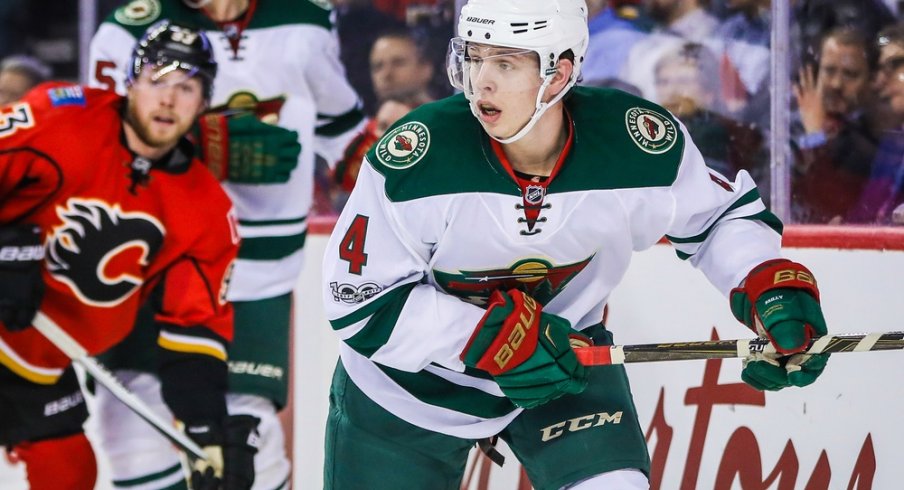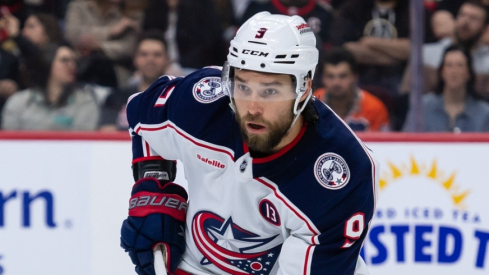I’ve been thinking for a while about writing a flashback to the summer of 2015 and the saga of Mike Reilly.
Then I read that, not surprisingly, it’s happening again.
The Columbus Blue Jackets haven’t been the only team in the NHL to fall victim of this particular language of the collective bargaining agreement, and it appears the Colorado Avalanche will be the next.
News broke recently that Hobey Baker Award-winning defenseman Will Butcher will spurn the Avs in favor of becoming a free agent Aug. 15. He could still sign in Colorado, but it seems rather unlikely that the University of Denver star will do so after hitting the open market.
This is a bit weird, is it not?
There are rumors that the Avalanche haven’t been too keen on signing Butcher – judged college hockey’s best player last year and a key part of a national championship-winning team – but not withstanding that, it is odd that there’s a stipulation in the agreement between the league and its players that punishes a team for drafting well.
Butcher was a fifth-round pick of Colorado in 2014 and now appears to be on the verge of an NHL career. Most fifth-round picks fall well short of playing even 100 NHL games, and it seems Butcher’s skills at the college level portend he’d do so, essentially making him a well-spent draft pick.
The same was true of Reilly when Columbus chose him in the fourth round (98th overall) in 2011. Reilly projected well thanks to his swift skating, skill and hockey sense, but he was just 5-10 and around 150 pounds at the time of the draft, meaning how he developed in college would be crucial to his NHL hopes.
And, after a year in the BCHL, develop he did at Minnesota, twice earning Big Ten Defensive Player of the Year honors and adding a World Juniors gold medal to his collection. By the time he finished his junior year with the Golden Gophers as a first-team All-American with 42 points in 39 games, he looked to be a nearly NHL-level player.
But during that final year with the Gophers, there were whispers he was considering turning down a deal from the Jackets – who reportedly it clear he’d have an immediate spot in Columbus – in order to become a free agent given his status as a player four years past his draft season. Though he would listen to overtures from Columbus, he eventually signed with his home-state team, the Minnesota Wild.
At the time, this was viewed as a huge blow for a Columbus team coming off a disappointing 2014-15 campaign, though one that ended with a hot streak that seemed to portend contention the next season. Reilly was viewed by many as someone who could step in to help the team’s beleaguered defensive corps, and to some it was another sign of how Columbus’ stock was viewed in the hockey world.
In the short term, it seemed losing Reilly did hurt. Columbus hemorrhaged goals while getting off to an 0-8 start the next season, but a few things have happened since then, including the acquisition of Seth Jones, the ascension of Zach Werenski, and the emergence of Markus Nutivaara and Gabriel Carlsson. Now, the team’s blue line looks like one of the strengths of a rapidly rising squad.
Meanwhile, Reilly has struggled to stick in Minnesota. He has two goals and six assists in 46 games over two years with the Wild while playing more than 100 games in the AHL the past two seasons. The idea that he would have stepped in right away to reshape the Columbus defense seems to have been slightly overblown, though he signed a one-way deal this offseason and appears to set to be a full-time NHLer with the Wild in 2017-18.
Reilly is far from the only player to go this route – Jimmy Vesey did the same last summer, spurning Nashville for the Rangers, and Kevin Hayes chose not to sign with Chicago to join the Rangers before Reilly – but it seems fair he’ll get a rude welcome anytime he laces ‘em up in Nationwide Arena in the future.
But is the system fair? I guess it’s not really my place, but it seems worth discussing. It’s a good point that everyday people siding with billionaire owners over million- and thousand-aire players in contract disputes is a foolish thing, and I think that’s true in most cases. I grew up in a union town and am in a union, and this is obviously something players have made a key point at the bargaining table.
Yet I’m not sure any system that punishes a team for doing its job well by making successful draft picks, especially in the lower rounds, makes a ton of sense either. The Blue Jackets’ reward for a smart draft pick, essentially a lottery ticket that paid off, in 2011 was to watch that player go elsewhere with no compensation before he even played a game.
It’s an interesting debate, and you can take whatever side you want. But if you’re a Blue Jackets fan, there’s plenty of solace to be taken in the current state of the Columbus blue line without Mike Reilly, and that’s what really matters.

